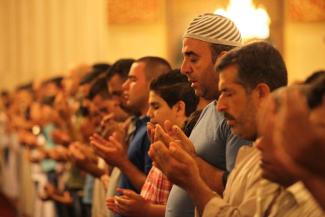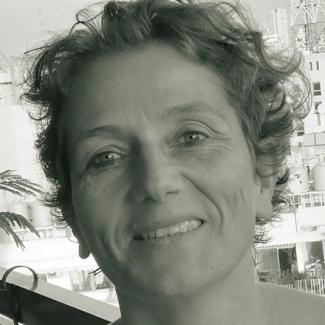Koran schools
More than holy scriptures
 AA/picture-alliance
Muslims in Lebanon: anyone who attaches importance to religious instruction sends their children to a Koran school.
AA/picture-alliance
Muslims in Lebanon: anyone who attaches importance to religious instruction sends their children to a Koran school.
In a melodic voice, Danya cites verses from the Koran by heart. The 15-year-old girl is sitting in a small bright classroom with another girl of her age. They come here for Koran tuition every Saturday. Danya enjoys the lessons. She is ambitious, and determined to become able to recite the entire sacred text from memory alone. She is interested in the content too, and wants to understand what rules of conduct the book contains.
Ibad Al-Rahman (Servants of the All-Merciful) is an Islamic organisation in Beirut. It encourages children and young people to study, recite and memorise the Koran. Primary-school children are part of the target group. Ahmad Houri is the organisation’s secretary-general. He stresses that its activities are designed to address hearts and minds.
Khadija Ajjawi is a 28-year-old teacher who used to be a student at the Koran school herself. She says that, while the lessons focus primarily on the Koran, they also tackle other subjects that are relevant for young people, including social networking. The organisation offers sporting activities for all age groups. Politics, however, is taboo at Ibad Al-Rahman. Lessons are free of charge. The organisation’s premises are located in a popular shopping area of West Beirut and some 130 girls attend its classes.
Minor subject in state schools
Muslim parents in Lebanon who want their children to get religious instruction send them to private religious organisations like Ibad Al-Rahman or to mosques that offer Koran classes. Religious education is not a core subject taught at state schools. According to Muhiyieddin Bayoun, who is responsible for religious teaching at the Office of Religious Endowments, which represents Sunni Islam in Lebanon, religious education has the same status in the state curriculum as sport and arts. The subject is taught once a week, he says, and deals with Islam in only very general terms. There is no time to memorise the Koran or even learn all the rules of recitation.
The Lebanese constitution guarantees freedom of religion. The state protects recognised religious groups and ensures they are able to perform their rites. It confers on them the right to provide religious instruction in state schools in areas where they account for the majority of the population. The constitution also allows religious communities to operate private faith schools.
Lessons for refugees
Around half of the girls at Ibad Al-Rahman in Beirut are Syrian. They attend the same Koran classes as their Lebanese counterparts.
Islamic organisations have worked to help Syrians since the beginning of the refugee crisis in Lebanon. They offer primarily humanitarian aid but also informal educational support for Syrian children. The subjects offered include maths, Arabic and Koranic studies. The tuition is financed by zakat, the Islamic system of giving alms, and by donations from the Gulf States. However, as Sarah Hasselbarth pointed out in her “Islamic Charity” study published in 2014, there are reasons to fear that religious classes are being used by radical Islamic groups to spread an ideologised form of Islam among Syrians in Lebanon (see article by Martina Sabra on Islamic welfare).
Bayoun believes his agency should step up its support for the Syrians in the country. He proposes cooperation between the UN Refugee Agency (UNHCR) and mosque communities in the areas where most refugees are accommodated. The mosques could teach core subjects for three to four hours on their premises, he says, and hire some Syrian teachers: “That would enable us to help 100,000 children and get them off the street. We could offer Arabic, English, maths and Islamic religious instruction.” Bayoun wants the foundation he works for to take the initiative. He believes it has a moral responsibility towards fellow Sunnis.
Teaching Wahabism in Tunisia
In Tunisia, Islamic organisations and the Koran schools they operate have been fuelling heated debate since 2011. As the country opened up after the overthrow of the autocratic president Zine el-Abedine Ben Ali, a great number of new associations, including Islamic ones, were established. Their aims are diverse. They act as an extended arm of political parties, engage in charitable work or try to spread their interpretation of Islam. Koran schools are an effective tool for doing that.
A furore was caused by Tunisian journalist Hanan Zbeis’ report on nursery schools run by a number of Islamic associations. The preschools that Zbeis investigated do not just introduce children to the alphabet and the Koran; they teach them the strict Wahabi interpretation of Islam. Zbeis interviewed parents who send their children to those Koran schools, and some were not even practising Muslims. The reasons they gave for choosing the schools were that they had “confidence in their devout teaching staff” and that “they were cheaper than other preschools”.
Mona Naggar is a journalist and media coach. She lives in Beirut.
mona.naggar@googlemail.com
Literature:
Mokbel, R., 2015: Al-Azhar rethinks primary school teaching to encourage moderation. In Al-Monitor, 14. Juli 2015.
http://www.al-monitor.com/pulse/originals/2015/07/egypt-azhar-quran-school-katateeb-update-modernize-curricula.html#ixzz3q33GuM4H
Links:
Hasselbarth, S., 2014: Islamic charities in the Syrian context in Jordan and Lebanon. FES 2014.
http://library.fes.de/pdf-files/bueros/beirut/10620.pdf
Islamic preschools in Tunisia (in Arabic):
http://arij.net/report/%D8%B1%D9%8A%D8%A7%D8%B6-%D8%A7%D9%84%D8%A3%D8%B7%D9%81%D8%A7%D9%84-%D8%A7%D9%84%D9%82%D8%B1%D8%A2%D9%86%D9%8A%D8%A9-%D9%81%D9%8A-%D8%AA%D9%88%D9%86%D8%B3-%D9%85%D8%AE%D8%AA%D8%A8%D8%B1-%D9%84%D8%AA/


